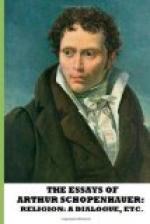* * * * *
The pain of an unfulfilled wish is small in comparison with that of repentance; for the one stands in the presence of the vast open future, whilst the other has the irrevocable past closed behind it.
* * * * *
Geduld, patientia, patience, especially the Spanish sufrimiento, is strongly connected with the notion of suffering. It is therefore a passive state, just as the opposite is an active state of the mind, with which, when great, patience is incompatible. It is the innate virtue of a phlegmatic, indolent, and spiritless people, as also of women. But that it is nevertheless so very useful and necessary is a sign that the world is very badly constituted.
* * * * *
Money is human happiness in the abstract: he, then, who is no longer capable of enjoying human happiness in the concrete, devotes his heart entirely to money.
* * * * *
Obstinacy is the result of the will forcing itself into the place of the intellect.
* * * * *
If you want to find out your real opinion of anyone, observe the impression made upon you by the first sight of a letter from him.
* * * * *
The course of our individual life and the events in it, as far as their true meaning and connection is concerned, may be compared to a piece of rough mosaic. So long as you stand close in front of it, you cannot get a right view of the objects presented, nor perceive their significance or beauty. Both come in sight only when you stand a little way off. And in the same way you often understand the true connection of important events in your life, not while they are going on, nor soon after they are past, but only a considerable time afterwards.
Is this so, because we require the magnifying effect of imagination? or because we can get a general view only from a distance? or because the school of experience makes our judgment ripe? Perhaps all of these together: but it is certain that we often view in the right light the actions of others, and occasionally even our own, only after the lapse of years. And as it is in one’s own life, so it is in history.
Happy circumstances in life are like certain groups of trees. Seen from a distance they look very well: but go up to them and amongst them, and the beauty vanishes; you don’t know where it can be; it is only trees you see. And so it is that we often envy the lot of others.
* * * * *
The doctor sees all the weakness of mankind, the lawyer all the wickedness, the theologian all the stupidity.
* * * * *
A person of phlegmatic disposition who is a blockhead, would, with a sanguine nature, be a fool.
* * * * *




